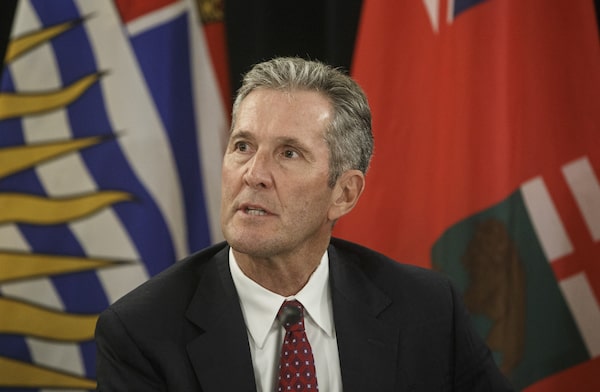
Brian Pallister has kept his conservative base happy by slashing the deficit.JASON FRANSON/The Canadian Press
Before Manitobans vote in next fall’s federal election, they’ll go to the polls a month earlier to choose the next provincial government.
It’s a year earlier than the 2020 fixed election date enshrined in legislation, a fact which has left broad swaths of the populace unamused. At this point, however, it appears doubtful that a majority will exact their revenge on the administration of Conservative Premier Brian Pallister when casting their ballot on Sept. 10.
Mr. Pallister is not the first premier to defy fixed election laws. It is usually done for one reason: The government believes its chances of re-election are far better going to the people earlier rather than later.
Despite an often-rocky three-year tenure, the Conservatives maintain a healthy lead over their centre-left rivals. The most recent polling showed the Tories with 42 per cent support across the province, compared with 26 per cent for the NDP, 16 per cent for the Liberals and an astonishing 14 per cent for the Greens. That last number is consequential, as it appears the surge of the Greens has come entirely at the expense of the Liberals and NDP.
Still, Mr. Pallister and his advisers must believe there are winds of change in the offing that could spell trouble. That may include the economy.
After solid economic growth in 2017 of 3.2 per cent, real GDP grew just 1 per cent a year later – just more than half the national average. This year’s real GDP is expected to improve marginally to 1.6 per cent, which would clock in at sixth among the provinces. Meantime, the average inflation rate of 2.5 per cent in 2018 was ninth among provinces. In other words, none of these numbers are setting the world on fire.
The one thing Mr. Pallister has done to keep his conservative base happy is slash the deficit. It will be less than $400-million by the end of this fiscal year – far less than the nearly $2-billion the Premier says it would have been under the direction of the former NDP government. He also reduced the sales tax from 8 per cent to 7 per cent – a promise that won him a ton of votes in the 2016 election.
The Premier also likely knows that his controversial reorganization of the health-care system will cause him more political pain before things improve. In a move aimed at realizing system efficiencies, the province converted three Winnipeg emergency rooms into less costly urgent-care centres. The move has mostly been unwelcome among doctors and nurses and vast numbers of the public as well.
The overcrowding that the move has created at those ERs that remain open was blamed for the death of a woman who waited hours for heart surgery. Nurses, in particular, will be on the warpath during the election campaign over the moves.
The Premier, meanwhile, continues to do things that leave the public bewildered and embarrassed.
He went to France to take part in the commemoration of the 75th anniversary of D-Day, but he was a no-show at the biggest ceremony held at Juno Beach, an event attended by the Prime Minister and several of Mr. Pallister’s provincial colleagues. His office later said he was meeting with officials for a starch company that will begin pea-processing operations in his province next year instead. It just so happens that it was around this time he began a European holiday with his wife.
The Premier is no stranger to controversies about his whereabouts. He’s sought refuge during Winnipeg’s brutally cold winters by spending weeks at a time at his vacation retreat in Costa Rica. He’s defended his many stints there by saying that getting away from the daily maelstrom of the job now and then was a promise he made to his family before he ran for his party’s leadership.
In many ways, the 6-foot-8 former basketball player is unlike any provincial leader in the country. He defies many of the long-standing tenets of politics, and maybe that’s not a bad thing.
But as comfortable as he appears to be with his party’s position heading into this vote, a lot can change in a short order of time. Recent elections from British Columbia to Atlantic Canada have proven that.
Mr. Pallister may think it was a politically savvy move to call an election a year earlier than mandated, but ultimately the voters will decide if that is the case – not him.
Keep your Opinions sharp and informed. Get the Opinion newsletter. Sign up today.
 Gary Mason
Gary Mason